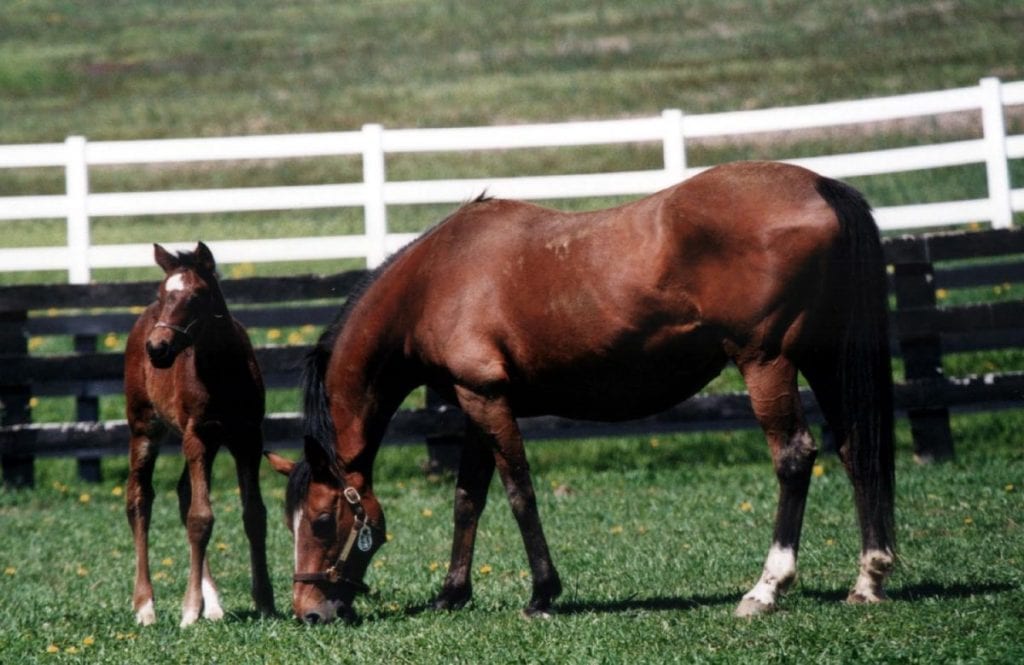Pennsylvania Thoroughbred industry could get boost from new law

Photo by Laurie Asseo.
by Linda Dougherty
The Pennsylvania Thoroughbred industry scored a big victory in legislation signed October 30 by Pennsylvania governor Tom Wolf that expands casino gaming in the state: It guarantees the current funding level to the Race Horse Development Fund (RHDF), diminishing the annual threat that has negatively impacted racing and breeding.
The RHDF, which is funded by a percentage of slots revenue at racetrack casinos, distributes money to purses at six tracks – three Thoroughbred and three Standardbred – plus breeding programs and horsemen’s pension and health plans. Last year, the RHDF distributed more than $240 million, according to the Pennsylvania Gaming Control Board in its annual report.
But since 2010, the Pennsylvania General Assembly has taken money from the RHDF to cover budget shortfalls in the General Fund, among other areas. To make matters worse, the announcement that the state was eyeing money from the RHDF usually came at the start of the breeding season. Because breeding a racehorse is at minimum a three-year commitment, the state’s breeders began dropping their foals in other states in which there was better financial stability.
The new legislation was written to end political interference, including a “clawback provision,” which requires giving back everything the state has taken out of the RHDF, estimated to be more than $200 million, should legislators decide to tap it again.
“The RHDF Trust (the formal name in the legislation) is a major victory for Pennsylvania breeding and racing,” said Brian Sanfratello, executive director of the Pennsylvania Horse Breeders Association. “We now have a deal with the state which accomplishes two major goals of our industry: the Trust states that the money does not belong to the Commonwealth, and if additional funds above the norm are withdrawn, the dollars that have been taken in the past must be immediately repaid. The Equine Coalition (horsemen and breeders’ organizations of both breeds) worked with our friends in the Senate to construct the language and work for its passage.”
Henry “Hank” Nothhaft, who bred champion Finest City in Pennsylvania but reduced his breeding operation to one mare because of concerns about the program’s long-term viability, said he planned to move some of his broodmares back to the state as a result of the new legislation.
“I’m pleased we’re trying to create some stability in the (breeding) program,” said Nothhaft, a Silicon Valley entrepreneur. “This sounds contradictory as the program has been stable, but the Governors and the legislature have made it appear unstable by threatening to take the RHDF away or reduce it severely on an almost annual basis. This sort of dialogue does not generate the confidence to plan and position valuable assets and make long-term plans in Pennsylvania. I have for some time thought the Pennsylvania program is terrific, but have been concerned about it suddenly going away.”
The expansion of casino gaming in Pennsylvania as defined in the legislation allows people to bet online, in airports and at truck stops. It also allows the state lottery to be played online, adds keno, and authorizes up to 10 new satellite casino licenses to be issued to current state casinos (which cannot be within 25 miles of another casino).
Daily fantasy sports betting will become regulated and taxed, and casinos also can apply to offer sports betting (currently being considered by the Supreme Court) if it becomes legal. A license for sports betting would cost $10 million. However, horse racing won’t benefit from this expansion, instead receiving the guarantee in the bill against the RHDF being raided.
Some racinos, such as the Hollywood Casino at Penn National in Grantville, have concerns that the new expansion bill means that there will be less revenue for horse racing.
“If our business was to decline – the brick and mortar of Hollywood Casino at Penn National – we would be giving less to the horse racing purse fund. For satellite casinos, it’s not written or designated that any of their money would be for horse racing purses,” said Hollywood Casino VP of Marketing Fred Lipkin.
Casino gambling in Pennsylvania generates $1.4 billion annually in tax revenue, the most in the country, and the casino industry in Pennsylvania is second only to Nevada, according to the Pa. Gaming Control Board.
Pennsylvania’s breeding industry, hard hit by the annual raid of the RHDF, rebounded this year by the number of mares bred, according to The Jockey Club. That rebound is expected to continue in years to come.
Of the top 10 states and provinces by number of mares bred in 2017, only Ontario, Pennsylvania and Indiana stallions covered more mares in 2017 than in 2016, as reported at the end of October. The number of mares bred in the Keystone State grew 15 percent in 2017, to 563.
Within five years after Act 71, which legalized expanded gaming in Pennsylvania, was passed, the breeding industry in the state exploded. In 2009, 1,753 mares were bred to 128 Pennsylvania stallions, while the 2009-2010 foal crops each consisted of more than 1,500 foals.
But the annual interference from lawmakers in Harrisburg saw an exodus of mares and stallions. This year’s foal crop numbers just 289, a decrease of 17 percent from last year, and there are only 36 stallions standing in Pennsylvania in 2017. Recent years have seen the shuttering of several major breeding farms, as well. This is the trend that the industry hopes will reverse with the passage of the new legislation stabilizing the RHDF.








That’s good news for Pa. breeding industry. What can be done to make thoroughbred racing more competitive with Maryland’s large field and improving quality. And Maryland purses aren’t as heavily subsidized with casino revenue YET.